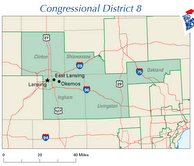As soon as I finished this morning's post (
"Hey, He's Got Job Security"), this popped up in the inbox:
From WHMI, "Rogers Splits With Michigan Delegation on S-CHIP
Rogers was one of only two Michigan Republicans to vote against the measure that extends health coverage to 4 million uninsured children.
Got that? Mr. Rogers was opposed to something that Thad McCotter supported. Vern Ehlers, Candace Miller and Fred Upton supported it, too.
Now, it's hardly a news flash that Mr. Rogers has
opposed S-CHIP for quite some time. It's irritating, sure; you could even add wrong-headed and mean-spirited. What it's
not is surprising.
According to the website of the U.S. Office of Personnel Management, the FEHB program offers working Members of Congress, retirees, and their survivors the widest selection of health plans in the country. In addition to health insurance benefits, Members of Congress may also receive dental, vision, as well as long-term care benefits. Generally the federal government (funded by the taxpayer) pays up to 75% of the health insurance premiums, and Members of Congress cover the other 25% out of their (taxpayer-funded) salaries.
In 2008 the standard Blue Cross Blue Shield Plan, for example, costs $448.91 per month for one person.
The government pays $314.25 of that and the federal employee pays $134.66. That’s about what most Medicare beneficiaries pay for their Part B and Part D premiums. But the vast majority of seniors, of course, don’t have anywhere near the incomes to cover their health insurance premiums that Members of Congress do. [skip]
Members of Congress are allowed to allot a portion of their pay to be used to pay their premium. The allotment is made on a pre-tax basis, which means the money is not subject to federal income, Medicare or Social Security taxes, and in most cases, state and local taxes. The allotment reduces their taxable income.
This bears repeating: Mike Rogers has an annual income of $174,000. He pays about one-quarter of the cost of his health insurance coverage, and he pays it in pre-tax dollars which reduces his taxable income.
Compare this with S-CHIP here in Michigan. A family earning an annual income of $35,200 (200% of the poverty level) is eligible for the program because they make too much to qualify for Medicaid.
Now, let's look at the cheapest individual Blue Cross/Blue Shield program in Michigan: ValueBlue/PPO. A family purchasing this as their first BC/BS will shell out $360.55 a month -- $4,326.60 per year (12.3% of their gross income, and it's paid in after-tax dollars). With this plan, the family will have:
Annual deductible: $2,000
Co-pays: 30%, with an annual maximum of $2,500
Out of pocket expenses: $4,500 maximum
Office visits: Not covered
Medical emergencies - 70% covered
Pre- and post-natal care: Not covered
The average mom (or dad) can tell you in detail about all the prenatal visits to ensure a healthy pregnancy, all the pediatric well visits to keep the kids' vaccinations up to date, as well as the visits for ear infections, strep throats, stitches, broken wrists, allergies... It adds up!
But Mike Rogers still doesn't think that working parents should get any help in keeping their kids healthy.
Way to promote those family values, Mr. Rogers.





